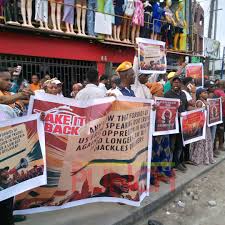Nigerians across the country marked Democracy Day on Thursday, June 12, 2025, reflecting on 26 years of uninterrupted civilian rule in the country. The day was a mixture of celebration and protest. While many came together in different cities to celebrate the return of democracy in 1999, hundreds of people also marched on the streets of Lagos, Abuja and other key cities to protest against the tough economic conditions, inflation and poor governance under their leaders.
Some of the protesters marched under the banner of #EndBadGovernance, a movement that first started last year in August 2024. The movement demanded that the government do more to ease the suffering of ordinary Nigerians who are battling a rise in food prices, a weak naira, growing unemployment and poor service delivery across sectors. The peaceful demonstrations were a way for ordinary people to say that promises made by their leaders to improve their lives have not been kept.
Protesters marched through the main streets of Ikeja in Lagos and the federal capital territory, Abuja. They held placards with messages such as “We want food, not promises” and “The people are suffering.” Some of the young people who marched were the children of those who fought hard for the return of democracy in 1999. They said their future hangs in the balance if the government fails to act quickly.
Supporters of the ruling All Progressives Congress (APC) and groups like “Team Nigeria for Change” called for peace and unity on Democracy Day. They insisted that this day should be a moment to celebrate how far the country has come and not a time for chaos. They maintained that while there are many problems, the country has made progress and should appreciate its achievements instead of focusing on the negatives.
Some members of the APC said June 12 is a powerful symbol of unity and sacrifice in Nigerian politics. They reminded the people that the 1993 presidential election was annulled by the military and the winner, Chief Moshood Kashimawo Olawale Abiola, was denied the opportunity to lead. His struggles paved the way for the return to civilian rule in 1999 and for subsequent electoral transitions. June 12, therefore, stands as a key milestone in the country’s democracy story.
Security was tightened in the federal capital and key cities to avoid a breakdown of law and order. Police and soldiers were visible on the streets to keep the peace. Nevertheless, the protests remained largely peaceful and there were no reports of violence. The mood was a mixture of hope and dissatisfaction — hope that the future can be better, and dissatisfaction with the present conditions.
Some civic groups called for unity, dialogue and reforms to resolve the country’s problems. They stressed the need for greater transparency, fairness and service delivery from the government. Activists insisted this is the true test of a thriving democracy — when people can voice their complaints and the government responds in a constructive way.
As the day drew to a close, many Nigerians were left reflecting on the future of their country. Will the promises made in the past be kept, or will the struggles continue for ordinary people?
This Democracy Day, marked by both celebration and protest, underscores the ongoing dialogue about the future of governance in Africa’s most populous nation. The people are asking for more from their leaders, and the leaders have a chance to respond by addressing the people’s struggles and honoring the promises of a true democracy.
